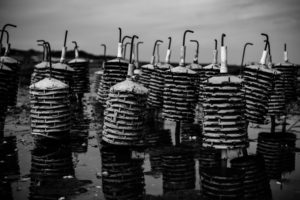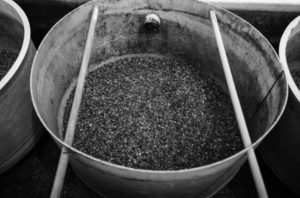WELLFLEET — Shellfisherman Bob LaPointe is grateful he will be able to grow half his usual crop of oysters and clams this year. That’s because Island Creek Oysters, one of only two hatcheries in the state, canceled its seed sales altogether, while the other, Aquacultural Research Corp. (A.R.C.) of Dennis, offered only limited quantities after losing two seed sets earlier in the year.

The misfortunes — brought about by the vicissitudes of nature — of the two main hatcheries in Massachusetts left 26 Wellfleet shellfishermen without seed for the summer and with just a limited supply going into the winter. LaPointe said the vulnerabilities of growing seed combined with the small number of hatcheries that supply commercial growers underscores the need to support A.R.C.
But support is not coming from the Wellfleet Select Board, which on May 24 revoked A.R.C.’s lease on a three-acre grant it has operated for 40 years off Indian Neck. The reason: the company’s owners don’t live in Wellfleet. And according to the town’s shellfish regulations, all grant holders must live in town.
The hatchery’s president, Rick Sawyer, argued at that meeting that the grant they were being asked to forfeit was critical to its business.
“A.R.C. is so important to the town,” LaPointe told the Independent on Monday. “If they went under, I think Wellfleet would be crippled for years.”
Sawyer asked the select board in an Aug. 29 letter to reconsider its May vote — at least until the end of the 10-year lease the town granted the company in 2017.
“It is our belief that this revocation was unfair, not in the best interest of the Wellfleet shellfishing community, done through a flawed process, and was a result of predetermined bias on the part of some board members,” Sawyer wrote.
Although A.R.C. was created in 1960, its focus on producing shellfish seed began in 1984. A modern hatchery was built after new ownership and investment came in 2015. It is now one of the largest growers of shellfish seed in New England.
To be profitable, the company must also sell full-grown shellfish wholesale. In Wellfleet, A.R.C. has used the three-acre grant as both a nursery and grow-out location. Its loss this summer cost the business $500,000, Sawyer said.
Rebecca Taylor, chair of the town’s shellfish advisory board, said she buys her seed from A.R.C. and so does nearly everyone else in town. She recuses herself from voting on A.R.C. matters. “I think Wellfleet is missing a prime opportunity to support Cape Cod’s only retail hatchery,” she told the Independent.
The state Div. of Marine Fisheries lists other seed hatcheries, but most do not sell in commercial volumes, Sawyer said. Practically speaking, only Island Creek in Duxbury and A.R.C. meet the needs of the town’s commercial industry, Taylor said.
This year, Island Creek told all its customers it would cease supplying seed for all of 2023, said Nick Sirucek, a Wellfleet shellfisherman and member of the shellfish advisory board. Meanwhile, at A.R.C., two spring seed sets died, setting back the schedule. Seed was crowded into the field nurseries and grew more slowly, Sawyer said.
Wellfleet shellfish farmers would not have been without seed in August if A.R.C. had still had its grant, Sawyer said. “We could have used it as a nursery, and we would not have had that problem.”
A One-Word Mystery
The “domicile rule” was written for a reason: to preserve Wellfleet oyster production and profits for locals. Select board Chair Ryan Curley told the Independent he won’t put reconsideration on the agenda unless other board members want it.
The town’s newest select board member, Kathleen Bacon, who was not on the board in May, said she does not favor reconsideration of the A.R.C. vote. “I am going to stand by the select board’s decision,” she said. “Now that our fishermen have gone without seed, A.R.C. feels they have some leverage. But with regard to our shellfish regulations, we are following the law.”

In May, Curley voted to revoke the lease along with board members Janet Reinhart and John Wolf. Helen Miranda Wilson voted against revoking A.R.C.’s lease, and Mike DeVasto, a commercial shellfisherman, abstained.
Sawyer said he may pursue legal action based on what he called Wellfleet’s flawed process. A.R.C. first received the three-acre grant in 1982. It was renewed continuously even after the domicile requirement was put on the books in 1987. The company was therefore “grandfathered.”
But at some point the word “new” before “grant holder” was dropped from the domicile regulation, so that now it reads that all grant holders must live in Wellfleet.
No one can find any record of when “new” was dropped from the text or who was responsible for the change, Shellfish Constable Nancy Civetta told the select board on May 24. There is no record of such an amendment of the regulations. Given that any amendment requires a hearing, Sawyer asked, is it valid?
In March, Wellfleet Town Counsel Gregg Corbo said that violating the domicile rule made A.R.C. liable to revocation “at the discretion of the select board.”
Civetta advised the select board later in March to allow A.R.C. to stay.
“The town and the shellfishing industry have always attached importance to A.R.C.’s presence here and believed it to be a benefit to the town and the greater good of the industry overall,” Civetta said on March 17.
Civetta later proposed two amendments that might have kept A.R.C. in Wellfleet. One would have put the word “new” back into the rule books. The other would have required A.R.C. to donate 150,000 quahog seeds annually and to disclose all its commercial and research activity in Wellfleet.
Both suggestions were ignored, Sawyer said.
Bacon said Civetta’s suggestions had “legal problems.” Bacon also said A.R.C. should have been doing research in Wellfleet all along, but that it began participating in a neoplasia study with Roger Williams University only “a few weeks ago.”
In fact, Civetta had written a letter to the select board notifying them of A.R.C.’s involvement with that research back in March.
What Next?
The shellfish advisory board last week discussed the need to find a way to support local hatcheries.
“It has been a rough year on seed,” Sirucek said. “Many hatcheries are having issues.”
He said he could not buy 200,000 clams and oysters because of the hatcheries’ environmental problems. Sirucek told the Independent the select board’s vote was “short-sighted.” The industry depends on seed, which comes from only five hatcheries in Maine, Massachusetts, and New York.
He worried that next year will be even worse. “I think we need to address this,” he said.



